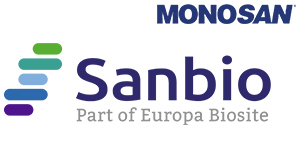Anti-ALPP Antibody Picoband™ (monoclonal, 6C7G3)
Anti-ALPP Antibody Picoband™ (monoclonal, 6C7G3)
Artikelnummer
SANMON23844
Verpackungseinheit
100μg
Hersteller
Sanbio / Monosan
Verfügbarkeit:
wird geladen...
Preis wird geladen...
Clone Number: 6C7G3
Immunogen: A synthetic peptide corresponding to a sequence at the C-terminus of human ALPP.
Concentration: Adding 0.2 ml of distilled water =f 500 μg/ml.
Format: Lyophilized
Storage buffer: Each vial contains 4mg Trehalose, 0.9mg NaCl, 0.2mg Na2HPO4, 0.05mg NaN3.
Additional info: At -20°C for one year from date of receipt. After reconstitution, at 4°C for one month. It can also be aliquotted and stored frozen at -20°C for six months. Avoid repeated freezing and thawing.Adding 0.2 ml of distilled water will yield a concentration of 500 μg/ml. Background: Alkaline phosphatase, placental type also known as placental alkaline phosphatase (PLAP) is an allosteric enzyme that in humans is encoded by the ALPP gene. The protein encoded by this gene is an alkaline phosphatase, a metalloenzyme that catalyzes the hydrolysis of phosphoric acid monoesters. It belongs to a multigene family composed of four alkaline phosphatase isoenzymes. The enzyme functions as a homodimer and has a catalytic site containing one magnesium and two zinc ions, which are required for its enzymatic function. The protein is primarily expressed in placental and endometrial tissue; however, strong ectopic expression has been detected in ovarian adenocarcinoma, serous cystadenocarcinoma, and other ovarian cancer cells. Subcellular Localization: Tissue Specificity:
Applications: WB,IHC,ICC,IF,FC
Immunogen: A synthetic peptide corresponding to a sequence at the C-terminus of human ALPP.
Concentration: Adding 0.2 ml of distilled water =f 500 μg/ml.
Format: Lyophilized
Storage buffer: Each vial contains 4mg Trehalose, 0.9mg NaCl, 0.2mg Na2HPO4, 0.05mg NaN3.
Additional info: At -20°C for one year from date of receipt. After reconstitution, at 4°C for one month. It can also be aliquotted and stored frozen at -20°C for six months. Avoid repeated freezing and thawing.Adding 0.2 ml of distilled water will yield a concentration of 500 μg/ml. Background: Alkaline phosphatase, placental type also known as placental alkaline phosphatase (PLAP) is an allosteric enzyme that in humans is encoded by the ALPP gene. The protein encoded by this gene is an alkaline phosphatase, a metalloenzyme that catalyzes the hydrolysis of phosphoric acid monoesters. It belongs to a multigene family composed of four alkaline phosphatase isoenzymes. The enzyme functions as a homodimer and has a catalytic site containing one magnesium and two zinc ions, which are required for its enzymatic function. The protein is primarily expressed in placental and endometrial tissue; however, strong ectopic expression has been detected in ovarian adenocarcinoma, serous cystadenocarcinoma, and other ovarian cancer cells. Subcellular Localization: Tissue Specificity:
Applications: WB,IHC,ICC,IF,FC
| Artikelnummer | SANMON23844 |
|---|---|
| Hersteller | Sanbio / Monosan |
| Hersteller Artikelnummer | MON23844 |
| Verpackungseinheit | 100μg |
| Mengeneinheit | STK |
| Reaktivität | Human |
| Klonalität | Monoclonal |
| Methode | Immunofluorescence, Western Blotting, Flow Cytometry, Immunohistochemistry, Immunocytochemistry |
| Isotyp | IgG2b |
| Wirt | Mouse |
| Konjugat | Unconjugated |
| Produktinformation (PDF) |
|
| MSDS (PDF) |
|

 English
English







